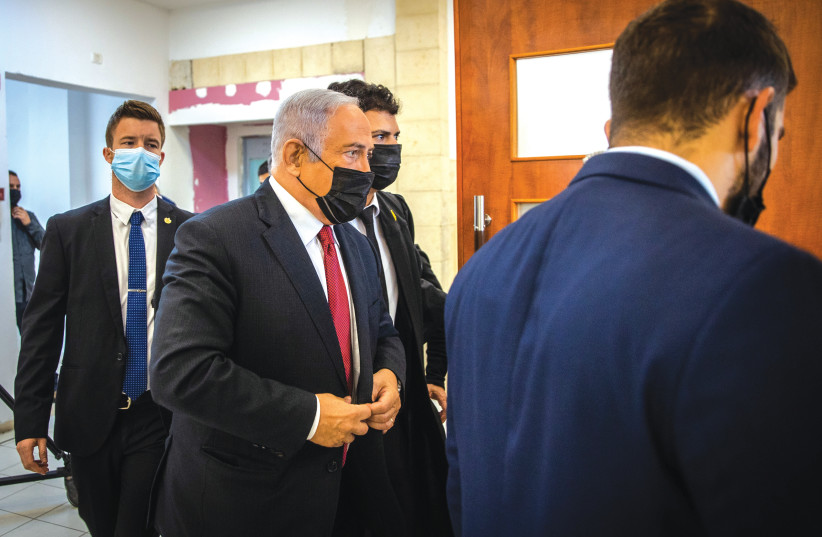After weeks of speculation that shook the country, the plea deal talks between former prime minister Benjamin Netanyahu and outgoing Attorney-General Avichai Mandelblit fell apart, leading to the resumption of the public corruption trial on Monday.
Where do things go from here?
Monday was a typical day for the trial.
Netanyahu’s former diplomacy issues spokesman Boaz Stembler testified for the prosecution that he was able to get special treatment from Walla CEO Ilan Yeshua.
If Stembler wanted to change a headline, a photo or adjust the treatment of an article, he testified that it was known that he could receive a much faster and decisive response from Yeshua than from virtually any other media outlet.

The prosecution even shared some text messages between the two in which Yeshua appeared to be pressing Stembler to come to him sooner than he had to complain about any part of the website that was not to Netanyahu’s liking.
All of this fits neatly into the prosecution’s portrayal of media bribery by Netanyahu in Case 4000, the “Bezeq-Walla Affair.”
But like with other witnesses, Netanyahu lawyer Boaz Ben Tzur managed to score some of his own points on cross-examination.
Stembler said that it was known that most Walla reporters – absent intervention from Yeshua – were known to be hostile to Netanyahu on diplomatic issues and were slightly more negative than positive on political issues.
In contrast, he said the average Walla reporter – again absent Yeshua’s intervention – would often give more flattering coverage to certain rivals of the prime minister.
Stembler also confirmed that Yeshua was far from the only CEO who he contacted to try to fix articles to be more to Netanyahu’s liking – and Netanyahu was far from the only politician who Yeshua tried to please.
So the part of the case where the prosecution preserves its narrative, but the defense pokes some holes continued.
One thing that was very different was the atmosphere.
Ben Tzur and prosecutor Yehudit Tirosh have often interrupted each other and gotten on each other’s nerves.
But Monday’s verbal sparring between them was so intense, constant and hostile that Judge Rivkah Friedman-Feldman asked the two at one point if they wanted to take a break to finish having it out with each other so that they could get to a point where they would be able to interact calmly and professionally.
Was this some leftover anger from the side’s failed plea deal talks?
Alternatively, was each side trying to present itself as determined to beat the other side into submission to get it to agree to concessions in future talks?
Regardless of the reasons, no interruptions in the trial are expected in the upcoming weeks or even months.
ANOTHER NETANYAHU spokesman, Shai Hayak, will testify after Stembler.
Then an important witness from the cable authority will testify: Dana Neufeld.
Though less well-known, she is very important because she is one of the few non-political officials who signed off on the YES-Bezeq merger which is at the center of the media bribery charge.
The prosecution will try to present her as signing off with her arm being twisted by the political class over the objections of the majority of the professional expert echelon.
If the prosecution succeeds, Netanyahu will lose an alibi protecting him from allegations of approving the merger to please Bezeq and Walla owner Shaul Elovitch, in order to get positive coverage from Walla.
Ben Tzur will argue that her stamp of approval removes any allegation that Netanyahu’s approval of the merger was problematic.
And if it was not problematic, then the whole bribery case falls.
By mid-February, former top Netanyahu aide turned state’s witness Shlomo Filber is due to testify.
Along with former top aide turned state’s witness Nir Hefetz, Filber is one of the prosecution’s two main witnesses.
If Hefetz provided the prosecution’s narrative for allegations against Netanyahu on the Walla side, Filber is expected to close the circle by providing the prosecution narrative against the former prime minister on the Bezeq side.
In fact, Filber’s testimony could be so damaging that avoiding his testimony was one of many reasons why Netanyahu was hoping to cut a deal with Mandelblit before the end of January.
Now Netanyahu will have to look into the eyes of another former close aide pointing the finger directly at him, while also staring at new Attorney-General nominee Gali Baharav-Miara – who lacks the back-history and appreciation of him that he had from Mandelblit – as being a new source of power over his fate if he wants to try to cut a deal in the spring or summer.
